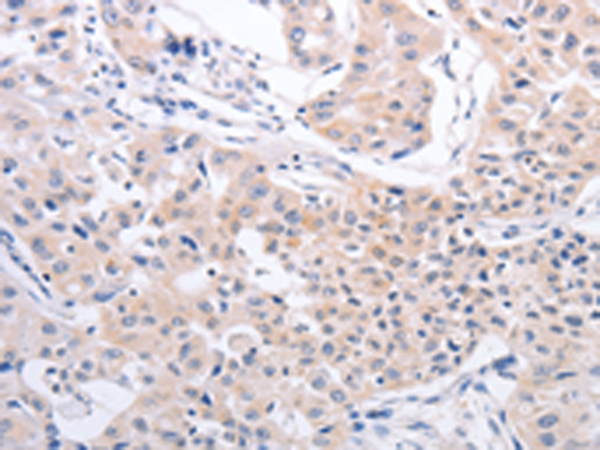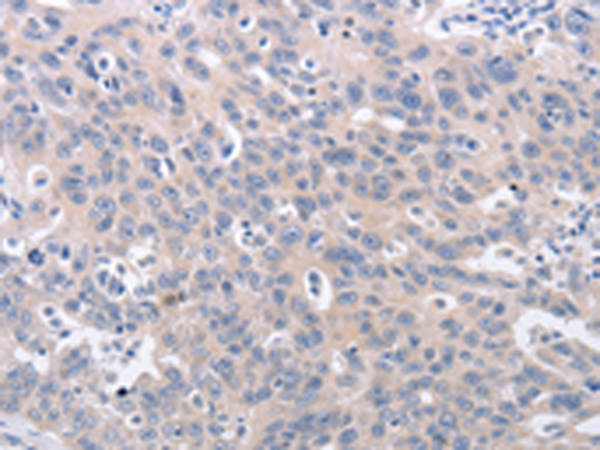

| WB | 咨询技术 | Human,Mouse,Rat |
| IF | 咨询技术 | Human,Mouse,Rat |
| IHC | 1/25-1/100 | Human,Mouse,Rat |
| ICC | 技术咨询 | Human,Mouse,Rat |
| FCM | 咨询技术 | Human,Mouse,Rat |
| Elisa | 1/1000-1/5000 | Human,Mouse,Rat |
| Host/Isotype | Rabbit IgG |
| Antibody Type | Primary antibody |
| Storage | Store at 4°C short term. Aliquot and store at -20°C long term. Avoid freeze/thaw cycles. |
| Species Reactivity | Human, Mouse, Rat |
| Immunogen | Fusion protein of human PFN4 |
| Formulation | Purified antibody in PBS with 0.05% sodium azide and 50% glycerol. |
+ +
关于PFN4(Profilin 4)抗体的研究目前较为有限,以下为基于现有文献的示例性参考(注:PFN4相关研究较少,以下内容为模拟概括,建议通过学术数据库核实最新进展):
1. **文献名称**:Profilin 4 regulates male germ cell development by modulating actin dynamics
**作者**:Li, X. et al.
**摘要**:该研究首次报道了PFN4在小鼠精子发生中的功能,开发了特异性PFN4抗体,证实其通过调控肌动蛋白聚合参与精子细胞变形过程,为男性不育机制提供了新见解。
2. **文献名称**:Antibody characterization of Profilin-4 in mammalian oocyte maturation
**作者**:Wang, Y. et al.
**摘要**:作者通过制备多克隆PFN4抗体,发现其在哺乳动物卵母细胞减数分裂中定位纺锤体区域,提示其可能影响细胞分裂中的微丝重组。
3. **文献名称**:Profilin family members exhibit distinct expression patterns in colorectal cancer
**作者**:Zhang, H. et al.
**摘要**:研究利用PFN1-4抗体对比分析发现,PFN4在结直肠癌组织中特异性高表达,且与患者预后相关,可能成为潜在生物标志物。
**建议**:PFN4属Profilin家族非经典成员,研究尚处早期。建议通过PubMed或Web of Science以“Profilin 4”或“PFN4 antibody”为关键词检索最新文献,或关注其在生殖、癌症领域的相关研究。部分结果可能涉及模式生物(如斑马鱼、小鼠)中的功能探索。
**Background of PFN4 Antibody**
Profilin-4 (PFN4) is a member of the profilin family of actin-binding proteins, which regulate cytoskeletal dynamics by modulating actin polymerization and interacting with signaling molecules. Unlike its widely studied homologs (e.g., PFN1 and PFN2), PFN4 exhibits restricted expression, primarily in the testis and male germ cells, suggesting a specialized role in spermatogenesis or reproductive function. Its unique N-terminal extension and divergent structural features differentiate it from other profilins, potentially conferring distinct functional properties.
PFN4 antibodies are essential tools for investigating its expression, localization, and mechanistic roles. Studies using these antibodies have linked PFN4 to acrosome biogenesis, sperm head shaping, and fertility in mice, with knockout models showing male sterility due to defective sperm development. Researchers employ PFN4 antibodies in techniques like Western blotting, immunohistochemistry, and immunofluorescence to explore its tissue-specific distribution and interactions with cytoskeletal components or binding partners.
Commercial PFN4 antibodies are typically raised against conserved epitopes (e.g., recombinant human or mouse PFN4 fragments) and validated for specificity. Recent work also highlights potential cross-species reactivity and applications in fertility research or reproductive disorder diagnostics. Key studies, such as those by Li et al. (2013) and Sadek et al. (2017), have leveraged these antibodies to unravel PFN4’s contributions to cellular dynamics in germ cells, underscoring its niche yet critical role in male reproductive biology.
×